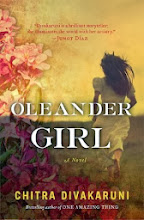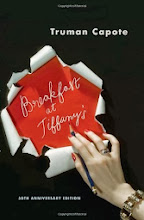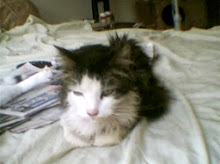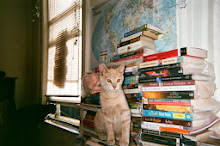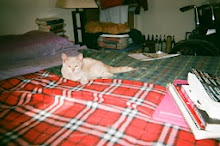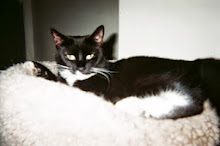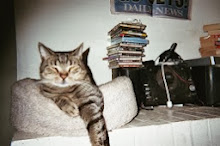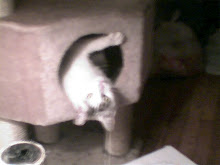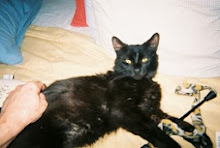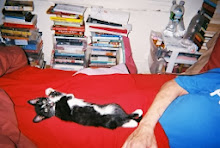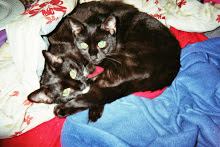
Villette by Charlotte Bronte
This is Week Eight, the Final Week of the read-a-long hosted by Wallace at her blog Unputdownables. This week's reading includes chapters 36 through the last chapter 42.
Summary: So we've come to the end of Villette. I really enjoyed this read-a-long. Thank you, Wallace and thank you to everyone who participated in the discussions. I'm happy that I read Villette as part of a group reading because I don't think I would have liked it as much or realized as much from it as I did had I read it on my own. Charlotte Bronte brought all of the story-lines to a neat and tidy end, concluding them all with no strings left hanging, although not necessarily to my satisfaction! Some of the last seven chapters were long, particularly one very fanciful chapter, but all were captivating and provided some great details including some interesting discussions of religion and M. Paul's acceptance of Lucy's Protestantism and a surprising answer to the mystery of the black & white nun!
My Thoughts: (this section contains spoilers)
I’m still thinking about Villette and will probably come up with more issues and questions, but for now here are my thoughts! I can't say I was surprised that Madame Beck turned out to be the real "villain" in this story but I was disappointed. It didn't seem right to me when she snooped through Lucy's things more than once and read her letters from Dr. John. She also seemed to know too much about the comings and goings and business of everyone. I never considered Madame Beck completely trustworthy but she's also a selfish, uncaring woman. And Père Silas. Oh my!
I was so angry when M. Beck kept Lucy from M. Paul the day he was supposed to leave. But I was impressed with how smart M. Beck was when she couldn't talk Lucy into going to bed and Lucy became angry with her, M. beck sends to persuade Lucy to go to bed, knowing full well that Lucy is too exhausted to have a "discussion" with Ginevra. I was really irritated again when Goton gave Lucy the sedative M. Beck wanted her to drink the night before. It was great that the sedative had the opposite effect on Lucy, putting her into an excited hallucinatory-type state. It's so out-of-character for Lucy to wander the town at night by herself.
It was an uncomfortable, strange scene when Lucy is at the festivities watching Dr. Bretton and Paulina, Mrs. Bretton and M. de Bassompierre and M. Beck, Père Silas and M. Walravens having a good time while Lucy watches from the sidelines, thinly disguised. I can't imagine she felt anything but terrible sadness and loneliness, especially since M. Paul wasn't making any real effort to see her. Lucy, though, is strong in spirit, as always and she doesn't dwell on depressing, sad ideas but becomes more determined to gain her independence.
My heart went out to Lucy when she learned the truth about Justine Marie (she's alive!) and then believed M. Paul would marry Justine Marie on his return from Guadalupe. I was so happy for her when she finally spoke with M. Paul, found out the truth and then saw the school! I was happy that he kept his obligation vis-à-vis M. Beck but chooses Lucy. I wasn't completely sure about M. Paul but these last chapters proved he was a kind, caring man with integrity.
The revelation about the black & white nun was quite a surprise to me. I didn't expect de Hamal was behind it. The supernatural theme here was a disappointment. Although I don't believe much in ghosts and things I was hoping for a more "romantic" story-line!
The passage about Dr. Bretton/Graham turning and looking right at Lucy at the festival and approaching her, backing off only when she makes it clear she doesn't want to talk to him is strange. I can't imagine that Graham didn't recognize Lucy since she was wearing only a shawl and hat as a disguise. But it's not like him to respect her wishes, he usually does whatever he wants regardless of what Lucy wants. I suppose it's possible he thought about how she might be feeling not having been invited to the festival with his group. and didn't want anyone's pity or false cheer at seeing her. The problem with this is it requires Graham to think carefully and closely about someone other than himself (or Paulina!). I'm not actually sure he's totally capable of this but I think Lucy believes he is. Lucy believes Graham cares about her as a friend but realizes absolutely that there couldn't be any love relationship between them because Graham is too selfish.
Dr. Bretton and Paulina's marriage is no surprise but I didn't expect her father to be quite so upset by their relationship. Some of it was teasing but I think M. de Bassompierre would have been very happy if Polly never married or waited several more years. Of course no man would be good enough for Polly from her father's point-of-view, but I think he felt a little bothered that it was Dr, Bretton. They worked together on several projects yet he had no inkling of Paulina and Graham‘s relationship. I think this bothered M. de Bassompierre.
In thinking more about Villette I realized I don't really understand Mrs. Bretton...why didn't she invite Lucy to the festival in Villette? I think Mrs. Bretton cares for Lucy but she easily forgets about her. She's a sweet, well-mannered woman but she's more like her son than I initially thought. Sure, she's charming and great at making people feel comfortable around her, but I think she's self-absorbed. I never understood why she didn't keep in touch with young Lucy after she left Bretton when she was a teenager. I know Mrs. Bretton had some troubles, but Lucy was a young girl who could have used a friend and/or some guidance. Mrs. Bretton acts like Lucy's best friend when she sees her but when she's busy and having fun it seems thoughts of Lucy disappear! I think Paulina is somewhat similar to Mrs. Bretton. Polly remembers to get in touch with Lucy when she needs a woman friend to talk to or complain to but when her life is busy, she forgets about Lucy.

























